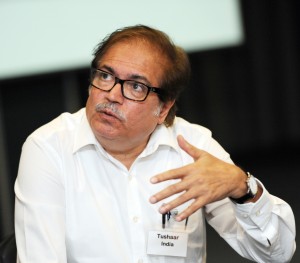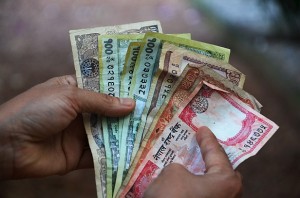Water and Energy
For World Water Day 2014, IWMI Director General Jeremy Bird reflects on the interconnectedness of water and energy and how IWMI’s research can help policymakers sustainably manage supplies of both.
Should we build more large dams?
A new report on the effectiveness of large dams has prompted the Agriculture and Ecosystems blog on World Water Day to ask five leading global experts, including Kim Geheb, Coordinator of the CGIAR Research Program on Water, Land and Ecosystems in the Mekong, and IWMI Director General Jeremy Bird if dam building has a bright future…
[one-half]
Hydropower to the people
Is benefit sharing working in Nepal?
Efforts to share the benefits of hydropower development in Nepal could be compounding inequality in the country instead of tackling it, according to research from the International Water Management Institute (IWMI).
One of the most water-abundant countries in the world, with vast areas of hills and mountains, Nepal has been the focus of hydropower development for decades.
But the local costs of hydropower projects can be significant. They can mean the displacement of farming communities to clear the way for dams or reservoirs, and disruptions to local hydrology and ecosystems. Meanwhile, the benefits – the production of electricity, primarily – accrue elsewhere, in relatively wealthy urban and peri-urban areas that enjoy access to the national grid.
In an attempt to address the mismatch, in the early 2000s, Nepal introduced a law to plough a portion of the revenues from taxes levied on hydropower companies back to the areas where their installations are located. Each year, this money is paid as a royalty to district offices and the larger ‘development regions’ in which they reside.
Read the full story… [/one-half]
[one-half last]
Indian water policy initiative receives World Water Day global award
Tokyo, Japan (March 21, 2014): A research program that pinpointed how perverse subsidies were causing India to export virtual water has won the coveted ‘Water for Life’ UN-Water Best Practices Award.

The IWMI-Tata Water Policy Research Program (ITP), a partnership between the International Water Management Institute (IWMI), Colombo, Sri Lanka, and the Sir Ratan Tata Trust, Mumbai, India, scooped the award for its groundbreaking work linking energy use, food production and water availability in Indian agriculture.
“We are greatly honored by this prestigious award,” said Tushaar Shah, leader of ITP and a Senior Fellow at IWMI, who accepted the award in Tokyo on behalf of the research team. “Many, many partners and several hundred student interns have helped us along the way, but our focus has always been to support India’s smallholder farmers and preserve our precious natural resources.”
Read the full story…[/one-half]


